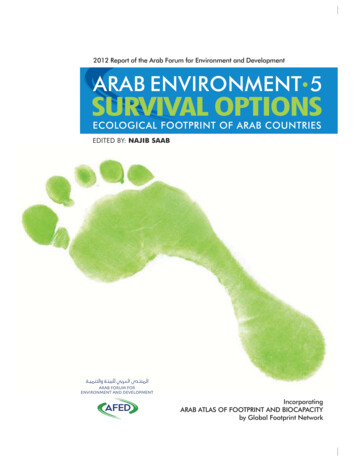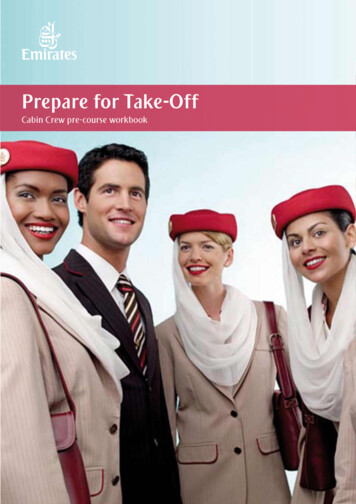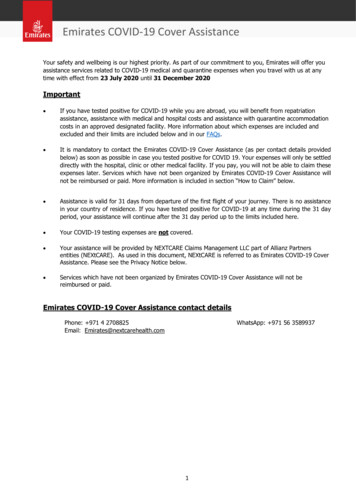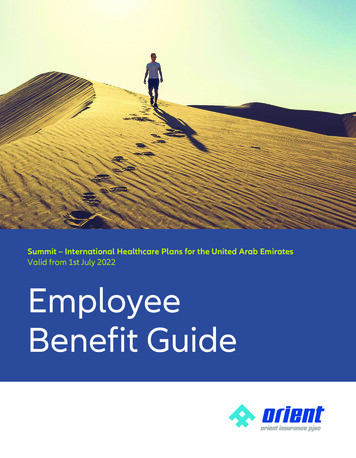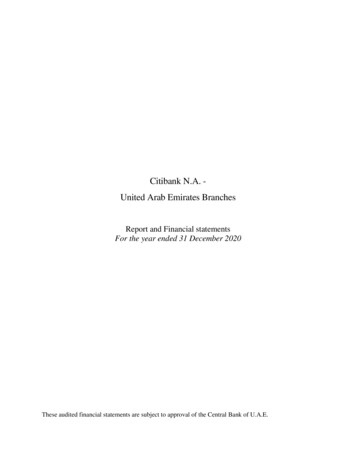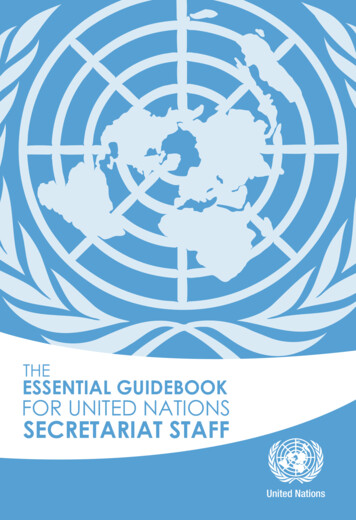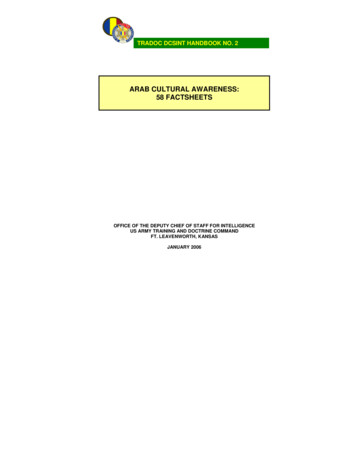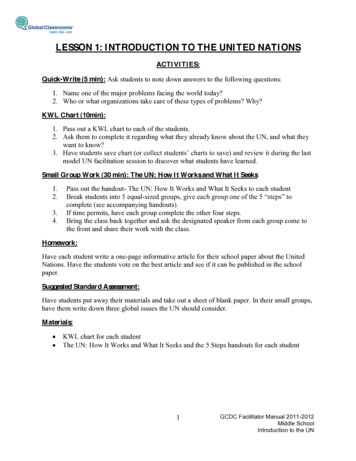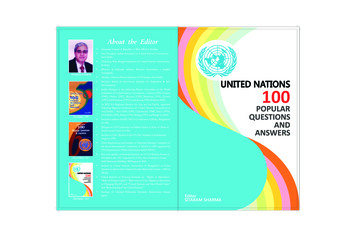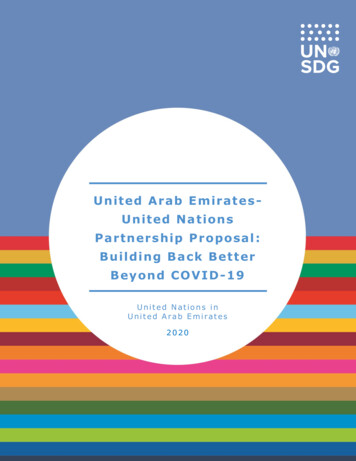
Transcription
United Ar ab E m ir at es United N a tionsP ar tner s hip P r oposal :Building B ack Bet t erBeyond COVI D -1 9United Nations inUnit ed Arab Emirates2020
Table of ContentsProposal Premise . 1Relevance to the United Arab Emirates . 1Proposal Structure. 2Focus Area 1: COVID-19 Containment and Recovery . 4Health First: Facilitating experience-sharing on integrated health systems that includepreventative care, mental well-being, and healthy lifestyles (SDG3) .4Virtual Education: Best practices on hybrid educational models to include global contentcross-fertilization of curricula, and peer education. .5Responsible Business: Work with chambers of commerce to promote labor welfare and workerfriendly corporate turnaround strategies particularly for hardest hit sectors. (SDGs 8, 10, 16). .5Focus Area 2: Accelerating Sustainable Development . 6Economic Diversification: Provide unbiased research on economic activity, capacity utilization,and sustainable growth prospects. (SDGs 8, 9, 12).6Green Technologies: Facilitate partnerships between the UN Technology assets and potentialUAE counterparts to promote a green economy. (SDGs 9, 17) .7Food Security: Provide policy advice on sustainable agriculture, food production and supply,biosecurity, and nutrition. (SDGs 2, 6, 12, 13, 14, 15) .7Climate Action: Present policy options on: Mitigating the differential impact of climate change,decarbonization, waste management, and environmental safeguards. (SDG 13) .8International Cooperation on Mobility (SGDs 1, 3, 4, 5, 8, 10, 11, 16, 17) .8Focus Area 3: Strengthening Social Cohesion . 9Women’s Empowerment: Develop campaigns for women empowerment to respond to COVID-19,and provide technical expertise on responding to gender-based violence (SDG 5, 10, 16, 17) .9Youth Empowerment: Propose interventions to strengthen youth well-being, resilience,and contributions to social cohesion and societal well-being. (SDGs 4, 5, 16) .10Child protection and well-being: Promote targeted interventions that enhance child welfareand address issues arising from COVID-19 related social changes. (SDGs 1, 2, 3, 4, 5, 6, 7) .10Dwelling Conditions: Assess urbanization plans in light of COVID-19, including quality of dwellings,density, and vulnerabilities from a prevention standpoint. (SDGs 9, 10, 11) .11Members of the United Nations Country Team in the UAE. 12
Proposal PremiseThe COVID-19 pandemic and associated economic crisis has resulted in profound changes across theworld, affecting all States and individuals. In April 2020, the United Nations General Assembly enacted aresolution instructing the United Nations system to coordinate a global response to the pandemic and itsadverse social, economic, and well-being impact on all societies1. In response, the UN Secretary-Generalapproved the UN Framework for the Socioeconomic Response to COVID-192, and tasked UN CountryTeams to develop national-level response plans that reflect national priorities while strengtheninginternational engagement for post-COVID recovery.The framework is designed in line with the broad objectives of Agenda 2030 and the SustainableDevelopment Goals, and includes a range of actions clustered under five pillars, addressing a. the publichealth crisis; b. social protection and service delivery; c. economic response and recovery; d. multilateralcollaboration; and e. social cohesion and community resilience. The framework emphasizes supportingpersons in vulnerable situations who need support the most under the premise of “leaving no onebehind”.Relevance to the United Arab EmiratesThe UAE is the region’s second largest economy and maintains unmatched appeal as a globally connectedeconomic and strategic hub for international trade and cooperation. UAE residents enjoy a high standardof living and quality of life as a result of a government bureaucracy and visionary leadership. The UAE iscurrently the second largest host of foreign population in the Middle East and North Africa (MENA) region,only surpassed in 2019 by the Kingdom of Saudi Arabia. Various factors explain the UAE’s considerableappeal to Temporary Contractual Workers, including its open and inclusive new system for long-termresidence visas since 2019 and the availability of numerous work opportunities that provide TemporaryContractual Workers from low-income countries with livelihood sources that can also support theirfamilies and communities back home with remittances. As a country that hosts more than 200nationalities3 and 87.9 percent of the total population from foreign countries, the health and well-beingof the Temporary Contractual Workers has of course a significant impact on the prosperity of the societyas a whole.4The UAE was the first country in the region to detect COVID-19 cases and was quick to enact measures tocontain its spread and enact a wide range of measures to limit its impact on the economy and society,including its foreign population. The UAE’s National Emergency Crisis and Disaster Management Authority(NCEMA) coordinates initiatives to contain the pandemic and mitigate its impact across the UAE in closecoordination with a wide range of federal and local government institutions. The UAE continues todemonstrate perceptive capacity to manage the COVID-19 response from its onset to ensure the safetyand socioeconomic wellbeing of citizens and residents in the UAE. Furthermore, the UAE, in a show ofinternational solidarity, has provided over 1,471metric tons of aid to 118 countries, supporting more than1.5 million medical professionals in the process5.1See General Assembly Resolutions A/RES/74/270 and A/RES/74/306 on Global Solidarity to Fight COVID19.United Nations (2020) A UN framework for the immediate socio-economic response to COVID-193 Fact sheet retrieved from: https://u.ae/en/about-the-uae/fact-sheet; Indians form the largest foreign community in the UAE,followed by Pakistanis, Bangladeshis, other Asians, Europeans and Africans.UAE Public Policy retrieved from: nt.aspx4 United Nations Department of Economic and Social Affairs (2019), Population Division, International Migrant ation/migration/data/estimates2/estimates19.asp5 As of 18 September 2020.21 Page
However, as the crisis continues to unfold, new policy and institutional measures continue to be neededto mitigate its impact and facilitate an inclusive economic recovery post-COVID. The UAE’s new cabinet,appointed in June 2020, has a clear mandate to work in this direction. It has identified specific areas ofwork focusing on revival of economic activity, improving service delivery including through digital means,investing in technology production and innovation, food and water security, amongst other areas. Thismandate has a significant overlap with the UN’s framework to Build Back Better, with a wide range ofopportunities for partnership and cooperation.Specifically, this partnership proposal intends to mobilize the United Nations System in service of thevarious UAE government entities, providing global expertise and facilitating triangular experience sharingof effective and ongoing policy and programmatic innovations in the identified action areas in line withthe UAE’s vision 2021, national priorities, and Agenda 2030 for Sustainable Development. The partnershipwill also showcase the UAE’s commitment to multilateral frameworks and include provisions for astronger UAE engagement within and through the United Nations various bodies.Proposal StructureThis proposal is the result of extensive consultations within the United Nations System in the UAE and atthe regional and global levels. It includes contributions from most of the over 30 UN agencies within theUAE’s UN Country Team, building on existing knowledge of current national priorities as well as ongoingareas of collaboration between UN entities and various UAE government agencies.Twelve areas of work are proposed, structured under three strategic focus areas. Gender equality andempowerment of women, inclusion including of persons of determination and older persons, youthengagement and empowerment, respect for human rights, and international cooperation are integralcross-cutting elements.The proposed areas of work are illustrative and open for further elaboration and development based ondiscussions with UAE counterparts and stakeholders. The intention is to showcase the types and range ofstrategic partnerships that can further strengthen the UAE’s response to the impact of COVID-19. Thisproposal is expected to continue evolving as the COVID-19 situation continues to unfold across the world.Additionally, the UN Country Team will adjust its engagement based on the needs and priorities of theUAE government to address the UAE context and requirements.The UN Resident Coordinator’s Office can facilitate the outreach to the UN agencies where the UAEgovernment determines further consultations and engagement would be most beneficial. Specific areasof partnership not articulated within this proposal and identified by the UAE government as a priority canalso be further pursued.2 Page
Focus Area 1: COVID-19 Containment and Recovery Health First: Facilitating experience-sharing on integrated health systems thatinclude preventative care, health standards and facilities, pandemicmanagement tools, mental well-being, and healthy lifestyles. (SDG3) Virtual Education: Best practices on hybrid educational models to includeglobal content cross-fertilization of curricula, and peer education. (SDG 4) Responsible Business: Work with chambers of commerce to promote laborwelfare and worker-friendly corporate turnaround strategies particularly forhardest hit sectors. (SDGs 8, 10, 16).Focus Area 2: Accelerating Sustainable Development Economic Diversification: Provide unbiased research on economic activity,capacity utilization, and sustainable growth prospects. (SDGs 8, 9, 12) Green Technologies: Facilitate partnerships between the UN Technology assetsand potential UAE counterparts to promote a green economy. (SDGs 9, 17) Food Security: Provide policy advice on sustainable agriculture, foodproduction and supply, biosecurity, and nutrition. (SDGs 2, 6, 12, 13, 14, 15) Climate Action: Present policy options on: Mitigating the differential impact ofclimate change, decarbonization, waste management, and environmentalsafeguards. (SDG 13) International Cooperation on Mobility: To explore new mobility partnerships,dialogues and frameworks to respond to mobility challenges posed by COVID19. (SDGs 1, 3, 4, 5, 8, 10, 11, 16, 17)Focus Area 3: Stregthening Social Cohesion Women’s Empowerment: Develop campaigns for women empowerment torespond to COVID-19, and provide technical expertise on responding to genderbased violence (SDG 5, 10, 16, 17) Youth Empowerment: Propose interventions to strengthen youth well-being,resilience, and contributions to social cohesion and societal well-being. (SDGs4, 5, 16) Child protection and well-being: Promote targeted interventions that enhancechild welfare and address issues arising from COVID-19 related social changes.(SDGs 1, 2, 3, 4, 5, 6, 7) Dwelling Conditions: Assess urbanization plans in light of COVID-19, includingquality of dwellings, density, and vulnerabilities from a prevention standpoint.(SDGs 9, 10, 11)3 Page
Focus Area 1: COVID-19 Containment and RecoveryActions proposed within this area focus specifically on providing tailored support for national efforts forthe containment of the COVID-19 pandemic towards overcoming its consequences on society. COVID-19is in its essence a public health crisis that affects the public health infrastructure and the population atlarge, as well as a human mobility issue. While a wide range of actions can be proposed to contain itsimpact, this focus area includes three actions which were identified as potential areas where the UNsystem can make immediate and important contributions to the government of the UAE.Health First: Facilitating experience-sharing on integrated health systems that include preventativecare, mental well-being, and healthy lifestyles (SDG3)Recognizing that the COVID-19 pandemic requires inclusive and comprehensive health systems sincepositive health outcomes for the whole of society very much depend on the inclusion of its mostvulnerable members, the UAE has promoted the physical and psychological health of citizens, residents,and temporary workers through a range of special health initiatives. These initiatives included specificfocus on essential workers, health professionals, older persons, people of determination, children andwomen, amongst others. The UAE has ensured the strictest regulation and inspection of health carefacilities and used its existing healthcare infrastructure effectively including through bringing in additionalsupport from outside the country. However, the UAE has only 1.3 hospital beds per 1,000 persons, whichis lower than the global average of 2.76. This presents an opportunity for further investments in thehealthcare infrastructure to serve all residents especially as the COVID-19 pandemic continues to unfold.The proposed actions for partnership with relevant UN entities in this area include:6-Integrated Public Health Policies for pandemic prevention, to include elements such aspsychological first aid to be rendered by frontline health workers, detecting air-borne pollutants,safe medical supplies and waste management, care for persons with pre-existing conditions,pregnant and lactating women, amongst others.-Inter-regional exchanges on best practices and lessons learnt, revolving around “what works” inearly detection and containment. Emphasis on preparedness plans for high-risk sectors such asinternational travel, hospitality and tourism, and the like.-Options for promoting healthy lifestyles during pandemics, particularly given closure of publicfacilities for sport and exercise such as gyms and swimming pools, as well as group sports. Thisalso includes addressing issues relating to nutrition and obesity.-Strengthening the national core capacity of International Health Regulations (IHR) forpreparedness and response to address health security and ensure the health system can continueproviding essential health care for all including temporary contractual workers, regardless ofstatus, before, during, and after the pandemic.-Implement remote surveys to assess perception and psycho-social impact of COVID-19 onTemporary Contractual Worker populations, which is used to inform messaging, provision ofservices, and identification of most at-risk individuals and groups.-Strengthening inter-agency (immigration, customs, health etc.) and cross-border coordination inline with principles of integrated border management will further ensure appropriate prevention,management and containment of the pandemic at points of entry. While enhanced and adaptedfacilities, tracing, tracking, and referral are regularly addressed by the government withWHO Data, 2016 data for UAE.4 Page
additional support to particularly vulnerable travelers (e.g. children, victims of trafficking, asylumseekers and others).-Support South-South and/or triangular cooperation for sharing best practices and methodologiesrelated to the health response to COVID-19.Virtual Education: Best practices on hybrid educational models to include global content crossfertilization of curricula, and peer education.In the foundational years of education, the impact of school closures might be the strongest on pupils,both girls and boys, and their families. Simulations in developing countries participating in the Programmefor International Assessment (PISA) suggest that without targeted support, a loss of learning by one-third(equivalent to a three-month school closure) during Grade 3 might result in 72 per cent of students fallingso far behind that by Grade 10 they will have dropped out or will not be able to learn anything in school.This is a profound risk facing over half a million pupils in the UAE, requiring a diligent follow-up andpreparation in order to mitigate the risks and capitalize on emerging opportunities. Consequently, theproposed actions for collaboration with the UN include:-Undertake a hybrid capacity absorption plan that targets pupils in nurseries and schools, withparticular attention to the online and in-person roles of social workers, child protectionspecialists, psychologists, activity teachers, nurses, and school managements.-Developing tools and instruments for measurement of attainment and progress in onlineeducation at school and university levels and propose measures to capitalize on virtualclassrooms for skill development across curricula and topics.-Provide options to ensure equitable access to education for all children regardless of residencystatus or financial abilities of the parents.-Introduce mechanisms for socialization among communities of pupils, per interest and learningarea, as well as across schools and regions for creative and recreational reasons. This can includeonline mentoring, peer-education, and coaching by older pupils.-Support the UAE in integrating awareness of the SDGs and leadership know-how to engage onthe SDGs within the UAE education system.-Facilitate for the UAE access to the knowledge sets and know-how on different methodologiesfor remote/virtual education, as well as inclusion of UAE capacities in global engagements tosupport the UAE’s advancement and access to global know-how in virtual education.Responsible Business: Work with chambers of commerce to promote labor welfare and workerfriendly corporate turnaround strategies particularly for hardest hit sectors. (SDGs 8, 10, 16).Over 4.2 million workers, including temporary contractual workers, are employed in medium to high-risksectors which are affected by the COVID-19 crisis, such as retail, aviation, construction, tourism, andhospitality. As a consequence, hundreds of thousands of foreign workers have already left the UAE orapplied for repatriation, despite a number of measures enacted by the federal and local government topreserve workers’ livelihoods to the extent possible. UAE authorities also continued to remind employers’of their responsibilities to settle due wages and other entitlements of workers and to pay for travel costsif a worker does not wish to work for a new employer or does not find another job and wishes to returnhome. However, as the COVID-19 crisis has shown, these measures need to be further supplemented toensure the welfare of foreign workers. Working closely with UN partners, the supplementary measurescan include:5 Page
-Support holding multi-stakeholder engagements and dialogue, including with workers, on therole of businesses in facilitating and accelerating economic recovery through retention ofworkers, exploring options for worker-friendly corporate turnaround, business process reform,and worker-friendly actions.-Support integrating workers providing essential services into the UAE’s COVID-19 socio-economicresponse regardless of workers’ status. Particular emphasis needs to be given to low-wage,temporary and informal sector workers, including construction and domestic workers.-Provide advisory services in relation to the living and working conditions of temporary contractualworkers, to protect their health, rights, and interests, as well as prevent exploitation, andsafeguard their dignity in times of crisis.Focus Area 2: Accelerating Sustainable DevelopmentDespite its negative impact on societal well-being and economic activity, COVID-19 presents anopportunity to redouble efforts towards advancing sustainable development and the internationallyagreed Sustainable Development Goals. The four action areas under this focus area are detailed below.Economic Diversification: Provide unbiased research on economic activity, capacity utilization, andsustainable growth prospects. (SDGs 8, 9, 12)The UAE is one of the first countries in the world to implement a contingency plan to contain theeconomic fallout of the COVID-19 crisis. The Central Bank has created a comprehensive economic supportplan to mitigate the impacts of COVID-19 on businesses and consumers. Furthermore, several federal andlocal government authorities have adopted plans and policies to soften the economic impacts of the crisisand to bolster the economy. The UN can partner with relevant UAE counterparts to complement theseefforts by proposing the following:7-Support the UAE’s economic analyses through economic modeling that accounts for externalitiesand whole-of-society impact and benefits. This may prove instrumental in validating keyeconomic assumptions to inform decision making by a neutral non-commercial entity.-Undertake research, expert consultations, and in-depth analysis on potential opportunities foreconomic diversification and growth in promising sectors and sub-sectors and the skill setsneeded for this diversification. This will include an assessment of current capacities, competitiveadvantages regionally and globally, and trends in international investment, skills mobility andtrade.-Promote the UAE as a destination for innovative and creative green investments, showcasing theUAE’s policies post COVID-19 and ongoing efforts and innovations towards a more sustainablefuture, in line with the joint UN-UAE Future Possibilities Report 20207.-Support the UAE in analyzing cross-border and regional economic cooperation opportunities inalignment with the UAE’s national priorities and COVID-19 /20200720 un75 uae futurepossibilitiesreport.pdf6 Page
Green Technologies: Facilitate partnerships between the UN Technology assets and potential UAEcounterparts to promote a green economy. (SDGs 9, 17)Agenda 2030 for Sustainable Development gave the UN a noteworthy mandate in strengtheninginternational cooperation in the area of technology transfer, particularly to address key sustainabledevelopment challenges. In this regard, the UN has a number of assets to provide technical support andadvisory services to member States in this area, such as the UN Technology Innovation Labs, UNTechnology Bank, and the UN Technology Transfer Facilitation Mechanism. Indeed, technology andinnovations present opportunities to address sustainable development challenges including thoseassociated with overcoming the impact of the pandemic. In this regard, the proposed actions forpartnership with the UN may include:-Facilitate communications and collaborations between the various UN assets working on greentechnologies with universities, research institutions, and other stakeholders in the UAE to identifypotential areas for engagement.-Organize international convenings in partnership with the UAE government on the contributionsof green technologies for sustainable development, technology-based solutions fordevelopmental challenges, and innovation partnerships with the private sector.-Promote research and development within the UAE towards increasing the production oftechnology and innovation in the UAE, and facilitate triangular cooperation for sharing Emiratigreen technologies with both developed and developing countries.-Promote climate-smart agricultural good practices that contribute to expanding the UAE’sagricultural sector, with emphasis on green technologies for climate adaption.Food Security: Provide policy advice on sustainable agriculture, food production and supply,biosecurity, and nutrition. (SDGs 2, 6, 12, 13, 14, 15)The UAE is committed to ensuring food security for every citizen and resident, as evidenced by its NationalFood Security Strategy 2051 that brings together the public and private sector to achieve sustainable foodsecurity. The government is promoting research, technologies and intelligence tools to develop the foodindustry and increase its domestic food production capacity. It is also implementing public awarenessprograms, which focus on food consumption, in order to promote healthy diets and reduce food loss andwaste. In support of these endeavors, the following areas for collaboration with the UN are proposed:-Promote knowledge exchange in sustainable agriculture, aquaculture and livestock sectors;promoting research, technology and innovation; and assessing food safety and pest controlsystems.-Improving biosecurity, including animal and plant diseases and pest control systems, detecting,preventing and responding to zoonotic pathogens, possible food contaminants and invasive alienspecies.-Strengthen sustainable water management systems, including surface and ground waterresources, saline and brackish waters utilization for agriculture, and non-conventional waterresources.-Expand support provided by the UAE Water Aid initiative to improve access to water andsanitation to countries in crisis in the region and across the globe.7 Page
Climate Action: Present policy options on: Mitigating the differential impact of climate change,decarbonization, waste management, and environmental safeguards. (SDG 13)The National Climate Change Plan of the UAE 2017–2050 has identified a range of priorities to reduce thecarbon footprint and make important steps to slowing down and reversing climate change as afundamental pillar of its better future. The UAE has made great strides in incorporating renewable energyinto its energy mix, expanded medical waste disposal programmes, and supported a wide range ofenvironmental presentation programmes on land and in sea. However, continuing increases intemperature, largely associated with climate change, can contribute to water scarcity, drought, rising sealevel and aridity in the UAE. This has the potential to intensify any existing environmental issues, andundermine gains made towards addressing climate change related problems. Building on the progressmade and addressing environmental issues, the UN identifies the following action areas for partnership:-Expand environmental protection programmes to mitigate the impact of climate change,airborne pollutants, and other risks on urban locations, agriculture and aquaculture, as well asnatural life.-Advise on integrated medical supplies production and waste management, as a byproduct of theCOVID-19 response.-Promotion of decarbonization, compactness of cities and application of circular economyprinciples to create jobs during the recovery and simultaneously reduce waste and costlyconsumption patterns and ensure future-proof cities in UAE.-Strengthening data collection processes on natural hazards present in the UAE and increasingpreparedness to manage risks posed by slow and quick onset natural hazards.-Strengthen early warning systems alongside community and national-level response capacitiesto mitigate and/or manage the impacts of climate change.-Engaging in policy dialogue with relevant countries around effective disaster risk reductionstrategies in situations where climate change is a threat multiplier, including efforts toincorporate mobility dimensions into planning and responses.-Explore the role the UAE can play in climate financing/climate insurance tools to support climateresilience.-Mapping community coping mechanisms to develop community-owned resilience plans thanengage both foreign communities and Emirati nationals. Building on this and supporting focusarea 3: strengthening social cohesion, there could be efforts to integrate technical expertise fromboth UAE and diaspora communities to strengthen resilience plans and DRR protocols.International Cooperation on Mobility (SGDs 1, 3, 4, 5, 8, 10, 11, 16, 17)Temporary contractual workers play important toles in the society and economy of the UAE, andtherefore supporting and facilitating existing and new mobility systems and partnerships becomes criticalto ensure organized supply of human capital and wellbeing of the workers in such a critical time. Suchefforts can also include comprehensive and state-level coordinated responses to the challenges posed byCOVID-19 to regular mobility. Specifically, this could include select areas for collaboration with UN entitiessuch as:-Facilitating dialogues and closer cooperation with key countries of origin to ensure rights-based,coordinated and safe and dignified return and readmission of Temporary Contractual Workers8 Page
not (or no longer) in possession of right to stay in the UAE. Enhanced cooperation in the fields ofidentity verification and post-arrival support to sustainable reintegration could be explored.-Promoting access to and availability of assisted voluntary return of those willing to but unable tofinance their return while enforcing employers’ responsibilities to cover associated costs.-Developing new short-term and targeted labor market visa schemes with key countries
Proposal Structure This proposal is the result of extensive consultations within the United Nations System in the UAE and at the regional and global levels. It includes contributions from most of the over 30 UN agencies within the UAE's UN ountry Team, building on existing knowledge of current national priorities as well as ongoing
